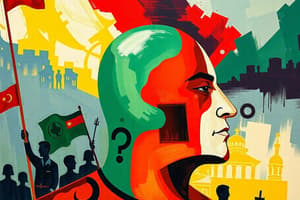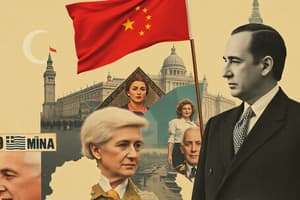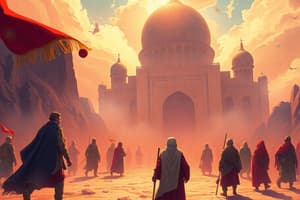Podcast
Questions and Answers
What aspect of a nation is represented by shared traditions, languages, religions, and history?
What aspect of a nation is represented by shared traditions, languages, religions, and history?
- Political
- Psychological
- Geographical
- Cultural (correct)
Which of the following best describes the political side of a nation?
Which of the following best describes the political side of a nation?
- It includes shared feelings of pride among citizens.
- It is focused on the governance and decision-making processes. (correct)
- It relates to the geographical boundaries of the nation.
- It encompasses common cultural backgrounds.
What is NOT a characteristic that differentiates a nation from other groups?
What is NOT a characteristic that differentiates a nation from other groups?
- Nations often have a government.
- Nations share a common ancestry. (correct)
- Nations have defined political borders.
- Nations are connected through culture and history.
How do nations form connections among their people despite not knowing everyone?
How do nations form connections among their people despite not knowing everyone?
Which of the following examples represents the psychological side of a nation?
Which of the following examples represents the psychological side of a nation?
What term refers to a group that shares a common ancestry and culture?
What term refers to a group that shares a common ancestry and culture?
Why is understanding nations important in the context of international relations?
Why is understanding nations important in the context of international relations?
Which of the following best describes the term 'imagined communities' in relation to nations?
Which of the following best describes the term 'imagined communities' in relation to nations?
What does Herderian nationalism emphasize about nations?
What does Herderian nationalism emphasize about nations?
Which factor is primarily associated with the emergence of nationalism according to Gellner's thesis?
Which factor is primarily associated with the emergence of nationalism according to Gellner's thesis?
How does social identity theory relate to nationalism?
How does social identity theory relate to nationalism?
What role does the state play in shaping national identity?
What role does the state play in shaping national identity?
Which aspect does Smith's critique focus on regarding nationalism?
Which aspect does Smith's critique focus on regarding nationalism?
What is the psychological need related to nationalism?
What is the psychological need related to nationalism?
What can nationalism inspire in societies?
What can nationalism inspire in societies?
Which of the following is NOT a consequence of nationalism as discussed?
Which of the following is NOT a consequence of nationalism as discussed?
What foundation did Rousseau provide for the concept of the nation as a political community?
What foundation did Rousseau provide for the concept of the nation as a political community?
What was a key outcome of the French Revolution regarding national unity?
What was a key outcome of the French Revolution regarding national unity?
How did Hobsbawm and Anderson view nations in their analysis?
How did Hobsbawm and Anderson view nations in their analysis?
Which of the following nations is characterized as a political nation with a diverse population?
Which of the following nations is characterized as a political nation with a diverse population?
What challenge do developing-world nations face in building national identity?
What challenge do developing-world nations face in building national identity?
How does the state contribute to shaping national identity?
How does the state contribute to shaping national identity?
What is a dual effect of globalization on national identities?
What is a dual effect of globalization on national identities?
What can nationalism inspire according to the discussion?
What can nationalism inspire according to the discussion?
Flashcards
Nation
Nation
A large group of people with shared culture, history, and a sense of belonging, often governed by a political structure.
Cultural aspect of a nation
Cultural aspect of a nation
Shared traditions, languages, religions, and history that define a nation's identity.
Political aspect of a nation
Political aspect of a nation
How a nation is governed—its rules, laws, and political system.
Psychological aspect of a nation
Psychological aspect of a nation
Signup and view all the flashcards
Nation vs. State
Nation vs. State
Signup and view all the flashcards
Imagined Community
Imagined Community
Signup and view all the flashcards
International Relations
International Relations
Signup and view all the flashcards
Ethnic group
Ethnic group
Signup and view all the flashcards
Nationalism
Nationalism
Signup and view all the flashcards
Volksgeist
Volksgeist
Signup and view all the flashcards
Herderian nationalism
Herderian nationalism
Signup and view all the flashcards
Social identity theory
Social identity theory
Signup and view all the flashcards
Gellner's Thesis
Gellner's Thesis
Signup and view all the flashcards
Smith's Critique
Smith's Critique
Signup and view all the flashcards
Cultural Identity
Cultural Identity
Signup and view all the flashcards
Psychological Need (in Nationalism)
Psychological Need (in Nationalism)
Signup and view all the flashcards
Political Nation
Political Nation
Signup and view all the flashcards
Nation as Political Community
Nation as Political Community
Signup and view all the flashcards
Popular Sovereignty
Popular Sovereignty
Signup and view all the flashcards
General Will
General Will
Signup and view all the flashcards
Invented/Imagined Community
Invented/Imagined Community
Signup and view all the flashcards
Nation-Building Challenges (Developing Worlds)
Nation-Building Challenges (Developing Worlds)
Signup and view all the flashcards
State's Role in Nation-Building
State's Role in Nation-Building
Signup and view all the flashcards
Globalization's Impact on Nations
Globalization's Impact on Nations
Signup and view all the flashcards
Study Notes
What is a Nation?
- A nation is like a large family, sharing language, traditions, holidays, and often a shared history.
- Nations have three main aspects:
- Cultural: Shared traditions, languages, religions, and history (e.g., French cuisine, Japanese tea ceremonies)
- Political: How the nation is governed (e.g., democratic nations like the U.S.)
- Psychological: Sense of belonging and national pride. (e.g., Scottish identity)
Nations vs. Other Groups
- State: A political entity with borders and a government (e.g., United States)
- Ethnic group: Shares common ancestry and culture (e.g., Kurds)
- Race: A social construct based on physical characteristics
The Imagined Community
- Nations are "imagined communities" – people feel connected even if they don't know everyone.
- Connections through shared stories, symbols, and history (e.g., American Revolution, popular culture)
Why Understanding Nations Matters
- Crucial for international relations (alliances, trade, conflict)
- Understanding nationalism (positive and negative outcomes)
- Essential for global citizenship (cultural appreciation, peaceful world)
Analyzing the Cultural Roots of Nationalism
- Herderian Nationalism: Nations have unique spirits (Volksgeist) in their language, culture, and history.
- This led to cultural revivals in 19th-century Europe.
The Psychological Basis of Nationalism
- Social Identity Theory: People naturally group together for belonging and security.
- Historical continuity: Tracing origins to ancient times to reinforce belonging.
Nationalism and Modernization
- Gellner's Thesis: Nationalism emerged as a response to industrialization and modernization, creating social cohesion.
- Smith's Critique: Modern nations are rooted in pre-modern ethnic groups, maintaining historical and cultural ties.
Key Points to Remember
- Cultural identity (shared culture, language, history) is fundamental to national identity.
Nations as Political Communities
- Exploring nations as political entities with civic loyalty and shared values.
- Rousseau, French Revolution, Hobsbawm, and Anderson's perspectives highlight nation-building.
- The state has a crucial role in shaping national identity (education, media).
- Globalization impacts national identity (positive and negative impacts of cultural exchange and hybridization).
Studying That Suits You
Use AI to generate personalized quizzes and flashcards to suit your learning preferences.




